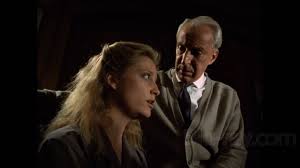We all know that Netflix recently debuted its first original series, House of Cards, and made all 13 episodes available for streaming. But you may not know that the American series (starring Kevin Spacey) is actually adapted from a British miniseries (also called House of Cards and starring Ian Richardson). And in my opinion, the British version is far superior.
 My fellow TV Slut Clovis recently wrote about the American version of House of Cards, and I agree with his assessment. The show is certainly engaging (some might even say addicting) and the relationship between Congressman Francis Underwood and his wife, Claire, is fascinating. And I also think that Clovis got it right when he pointed out that the Washington depicted in the show does not really exist and the writing is not always up to par.
My fellow TV Slut Clovis recently wrote about the American version of House of Cards, and I agree with his assessment. The show is certainly engaging (some might even say addicting) and the relationship between Congressman Francis Underwood and his wife, Claire, is fascinating. And I also think that Clovis got it right when he pointed out that the Washington depicted in the show does not really exist and the writing is not always up to par. But do you want to watch a version of the show that fixes these problems? Watch the British miniseries from the 1980s. It's also available on Netflix streaming (at least usually--when I tried to watch it last night I got a "content unavailable" message. Coincidence? I think not. I bet Netflix wants you to only watch their version of the story).
The British series follows a similar plot as the American version and is based on the novel House of Cards by Michael Dobbs. From wiki:
"The antihero of House of Cards is Francis Urquhart, a fictional Chief Whip of the Conservative Party, played by Ian Richardson. The plot follows his amoral and manipulative scheme to become leader of the governing party and, thus, Prime Minister of the United Kingdom."
See what I mean about the similarities? Francis Urquhart is also the whip of the controlling party and is also denied a senior cabinet position in the new government, much like Francis Underwood is denied the position of Secretary of State. There are also other plot similarities: both men begin a relationship with a young reporter in an effort to control the media's message and both resort to murder to get what they want. Oh, and both have STONE COLD wives who are supportive of their various machinations.
But that's basically where the similarities end. Because where Underwood is sneaky and manipulative...Urquhart is full on maniacal and sociopathic. You think the things Underwood does are under-handed? Bitch, please. Urquhart brings down the government and delights in it. He revels. When he turns to the camera and delivers his monologues there is such an air of menace and malice that it will freeze your blood.
Ian Richardson has already come up with 10 ways to kill you. THROUGH THE COMPUTER.
In the American version, you get the feeling Underwood does these things because it's really the option left to him. He tried playing the game as a good guy and now it's time to change the rules. But that feeling of revenge fizzles out after the first few episodes and we are left with a man's naked ambition. But for Urquhart, it's all about full on Shakespeare "dish best served cold" style. He is going to make those bitches PAY. Also, while the characters both perform similar roles in their quest for power (lover to a reporter, murderer), please believe me when I say that Urquhart's are FAR MORE fucked up.
He makes her call him "Daddy."
Have you ever seen Othello? You know those parts where Iago is delivering his monologues and really lets his crazy shine through, but then he turns to the other characters and seamlessly plays the "just one of the boys best friend" part? Ian Richardson has that shit down cold. The other characters continually underestimate Urquhart because he just seems like an old stodger. But then you get a glimpse at the man's mind and his plans...and damn. You really believe he could contrive to rule the world.
Andrew Davies (the acclaimed British screenwriter whom you might know from Pride and Prejudice and Bleak House) wrote the original House of Cards and the quality of the writing and acting is astounding. Not that Kevin Spacey is a slouch, but Ian Richardson brings the full force of his Shakespearean training to the part. There's a gleam in his eye and a song in his heart as he takes down the government, and you'll find yourself riveted. He often spoke about he used Richard III as a model for the character...and it shows.
The original House of Cards was recommended to me by a college government professor. I first watched it in...say 1999...and it has stayed with me ever since. While watching the American version, I couldn't help but think*, "this could never actually happen." First of all, no American politician is that smart. Second, the situations and manipulations just never seem real. But something about the British version...y'all it feels REAL. And that's the most terrifying part.
The British House of Cards (called The House of Cards Trilogy (BBC)) is available from Netflix streaming and on DVD. It consists of three miniseries, House of Cards, To Play the King, and The Final Cut.

